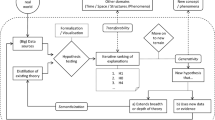Abstract
I first argue why Stanley and Williamson fail to eliminate the distinction between knowledge-that and knowledge-how. Then I argue that knowledge-how consists in a special kind of ways of thinking of ways of engaging in actions. So the distinction between knowledge-that and knowledge-how is twofold: the objects of knowledge-that and knowledge-how are different; the ways in which we entertain the object of knowledge are also distinct when we have knowledge-that and knowledge-how. At the end, I consider two recent intellectualist efforts on knowledge-how and show why they fail.
Similar content being viewed by others
Notes
By ‘in a knowledgeable way’, I mean that the entertainment of the true proposition satisfies the else conditions that are required for it to be counted as knowledge, whatever the else conditions are.
Surely, one can insist that modes of presentation are semantically irrelevant, they are only of pragmatic relevance. This won’t affect my main argument since we still can talk about modes of presentation, though not as something relevant to truth-value or truth-condition of knowledge ascriptions, but something pragmatically conveyed by the use of knowledge ascriptions.
References
Bengson, J., & Moffett, M. A. (2007). Know-how and concept possession. Philosophical Studies, 136(1), 31–57.
Brogaard, B. (2012). “Knowing how: A united account”. In J. Bengson, and M. Moffett (Eds.), Knowing how: Essays on knowledge, mind, and action. Oxford University Press.
Dretske, F. (1969). Seeing and knowing. London: Routledge and Kegan Paul.
Noë, A. (2005). Against intellectualism. Analysis, 65(4), 278–290.
O’Brian, D. (2004). “The epistemology of perception”. In Internet encyclopedia of philosophy, URL=http://www.iep.utm.edu/epis-per/#SH1a.
Ryle, G. (1945). Knowing how and knowing that. Proceedings of the Aristotelian Society, 46, 1–16.
Ryle, G. (1949). The concept of mind. Chicago: University of Chicago Press.
Snowdon, P. (2003). Knowing how and knowing that: A distinction reconsidered. Proceedings of the Aristotelian Society, 104, 1–29.
Stanley, J., & Williamson, T. (2001). Knowing how. Journal of Philosophy, 98(8), 411–444.
Williamson, T. (2000). Knowledge and its limits. Oxford: Oxford University Press.
Acknowledgements
This project is supported by the Fundamental Research Funds for the Central Universities, and by MOE (Ministry of Education in China) Project of Humanities and Social Sciences (Project No. 11YJC720036).
Author information
Authors and Affiliations
Corresponding author
Rights and permissions
About this article
Cite this article
Ren, H. The Distinction between Knowledge-That and Knowledge-How. Philosophia 40, 857–875 (2012). https://doi.org/10.1007/s11406-012-9361-x
Received:
Revised:
Accepted:
Published:
Issue Date:
DOI: https://doi.org/10.1007/s11406-012-9361-x




